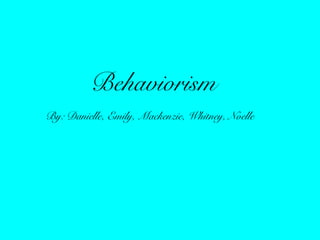
Behaviorlism
- 1. Behaviorism By: Danielle, Emily, Mackenzie, Whitney, Noelle
- 2. Behaviorism • As stated in the Teachers Discovering Computers behaviorism, “is the prediction and control of human behavior in which introspections and independent thinking play no essential part of its teaching methods. “
- 3. Founder: Ivan Pavlov • Became famous for his behavioral experiments with dogs • Won nobel Prize in Physiology in 1904 • Coined and created Classic Conditioning
- 4. Founder: B.F. Skinner • Created another form of conditioning that is labeled Behavioral or Operant conditioning. • Used Positive and Negative reinforcement
- 5. Founder: Albert Bandura • Famous for his ideas on social learning, later renamed Social CognitiveTheory • Observational Modeling: watching and then mimicking the observed behavior to learn • Self-efficacy: Personal observation about one’s perceived ability to feel, think, and motivate oneself to learn.
- 6. Classroom implications • Teachers use the idea of positive and negative reinforcement and classic conditioning to get children to do the right thing in the classroom. • A major thing for the teacher to give the students feedback, positive feedback for good behavior and somewhat of negative feedback for bad behavior. • Group work can also be beneficial for these children because of their easiness to external stimuli.
- 7. Classroom implications... • Children will need to know what stimuli works for them because every child learns and works differently. So them knowing what works best for them will allow them to get the most of every lesson.
- 8. Teaching in the • Classroom We believe this theory works well in a classroom because it allows students something to work for. • Getting positive feedback and rewarded for good grades or behavior makes them want to continue to do good in school. • This theory provides lots of different methods so they can choice the way they work best • It is something we definitely have to keep in mind for our own teaching to watch and alter the feedback we give our students to make sure it is appropriate for them because it affects their learning process so much. We have to make sure we are giving them the right type of feedback at exactly the right time.
- 9. Work Cited • http://www.nobelprize.org/nobel_prizes/medicine/laureates/1904/pavlov-bio.html • http://www.google.com/imgres?q=b.f.+skinner&hl=en&client=safari&sa=X&tbo=d&rls=en • http://webspace.ship.edu/cgboer/bandura.html • Textbook: Teachers Discovering Computers: Integrating Technology in a Connected World